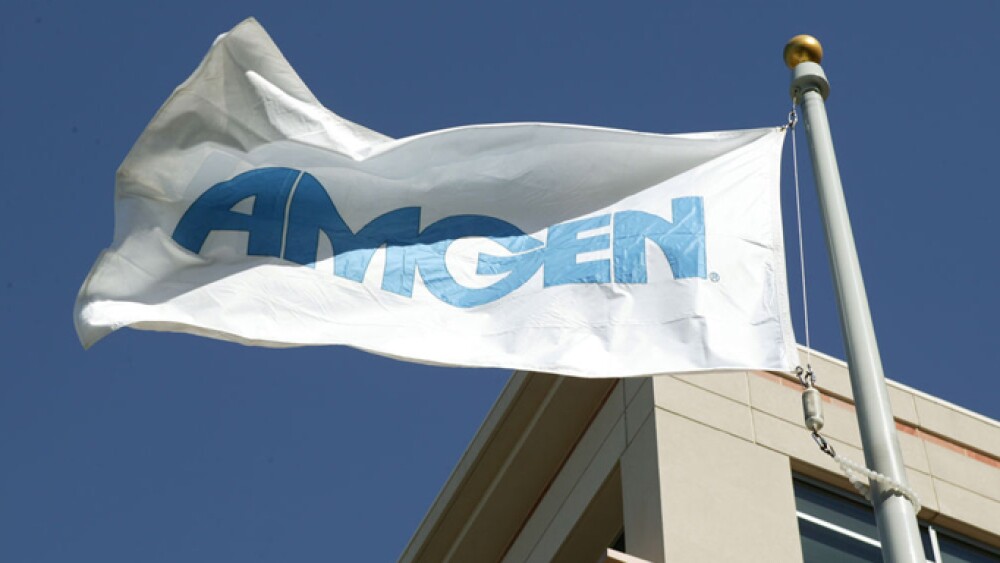March 17, 2017
By Mark Terry, BioSpace.com Breaking News Staff
Thousand Oaks, Calif.-based Amgen released the results of a large outcomes study of Repatha (evolocumab) with great—but potentially not great enough—results.
Repatha is a new class of cholesterol drug, a PCSK9 inhibitor. It blocks PCSK9, which affects the liver’s ability to remove cholesterol from the blood. Studies have shown that using PCSK9 inhibitors with statins cuts LDL cholesterol by 40 to 60 percent, compared to statins, which reduce cholesterol levels by approximately 25 to 35 percent. Regeneron Pharmaceuticals and Sanofi beat Amgen to the market with the first PCSK9 inhibitor, Praluent (alirocumab).
Although Repatha was approved on the basis of effective lowering of cholesterol levels, especially in hard-to treat patients, further study was needed to prove that the drug would increase the chances of survival and decrease the risk of heart, stroke and other heart-related health problems. It has a price tag of about $14,000 per year before discounts, which is significantly more expensive than the typical statin, which runs about $50 per month.
Amgen’s new study, which involved 27,564 patients, did in fact, show that the drug led to more cuts in major cardiovascular events, including heart attacks, strokes and coronary revascularizations. But the results weren’t as positive as doctors and probably Amgen were hoping.
“I think it’s a solid ‘B,’” Harlan Krumholz, a cardiologist and epidemiologist at Yale Medical School, told Matthew Herper with Forbes. “If they’d met the expectations on what the drug was going to achieve, it would have made a big difference. On the other hand, they could have shown nothing.”
Steve Nissen, an Amgen investigator with the Cleveland Clinic, told Forbes’ Herper, “Now the debate is who should get the drugs.”
Stock analysts and cardiologists were hoping Repatha would cut the risk of heart attacks, strokes, deaths from heart disease, and hospitalizations due to chest pain, as well as stent and heart bypass procedures, by as much as 30 percent. Herper writes, “instead, that result was just 15 percent, although the drug did better on reducing heart attacks and strokes, two of the measures that matter most. But Repatha also had no effect at all on whether patients died.”
It’s not as if anyone can say that drug is a failure or isn’t effective at what it’s doing. But investors were looking for a miracle drug, and cardiologists were looking for a very clear-cut answer on whether the drug’s effectiveness justified the price tag for a broader set of heart patients. Neither got exactly what they were hoping for, although there appears to be plenty of data to work with, particularly as more information is developed and analyzed.
“This is a game changer for high-risk patients,” said Sean Harper, Amgen’s executive vice president of research and development, in a statement. “Even though these patients were optimally treated with the latest therapies, they were still at high risk for an additional cardiac event. It’s remarkable to see such a large impact in reducing cardiac events given that this patient population was only on Repatha for about two years. The absolute benefit will be even greater than what we observed in the Repatha outcomes trial, since the cardiovascular event rate in clinical practice is about 2-3 times higher than what is typically reported in a rigorously controlled outcomes trial.”
Sekar Kathiresan, a cardiologist and geneticist at Massachusetts General Hospital, told Forbes’ Matthew Herper, that the reduction in LDL cholesterol seen in the study should have resulted in a 31 percent reduction in heart attacks and strokes. So the 15 percent reduction has eyebrows raised.
Herper notes several potential reasons. “One reason,” he writes, “is the measure of success Amgen chose. In order to get more statistical power in clinical trials, drug companies and cardiologists often lump ‘hard’ measures like heart attacks, strokes and deaths together with less important but more common problems like being hospitalized for chest pain or needing a stent to open a clogged artery.”
Repatha cut the rate of heart attacks 27 percent. It cut stroke 21 percent. It reduced stents and heart bypass procedures 22 percent. “But,” Herper writes, “on hospitalizations for chest pain, it did nothing—1.7 of 100 people in both groups were hospitalized for chest pain.”
Chest pain can be caused by a number of things, including things such as acid reflux that have no direct link to heart disease. Marc Sabatine, the cardiologist with Brigham and Women’s Hospital who led the Amgen study, notes that it’s possible that chest pain may no longer be a good measurement for clinical trials.
Another area that caught most off guard was Repatha’s impact on whether patients lived longer. For patients on Repatha, 1.8 of 100 died of cardiovascular causes, compared to 1.7 on placebo. The “cardiovascular causes” weren’t always heart attacks and strokes, but sudden cardiac deaths, where the reasons are essentially unknown. So it’s possible the drug doesn’t affect sudden heart attack death, although the deaths of fatal heart attacks and strokes were slightly improved for the Repatha group, the improvement wasn’t large enough to draw conclusions.
Forbes’ Herper wrote, “Answering the question of who should get Repatha is largely being left to the giant companies that manage drug benefit programs for insurers and employers, including CVS Caremark, Express Scripts and some units of UnitedHealthcare. Representatives of CVS and ExpressScripts say they expect the results are good enough to drive increased use of the medicines.”





